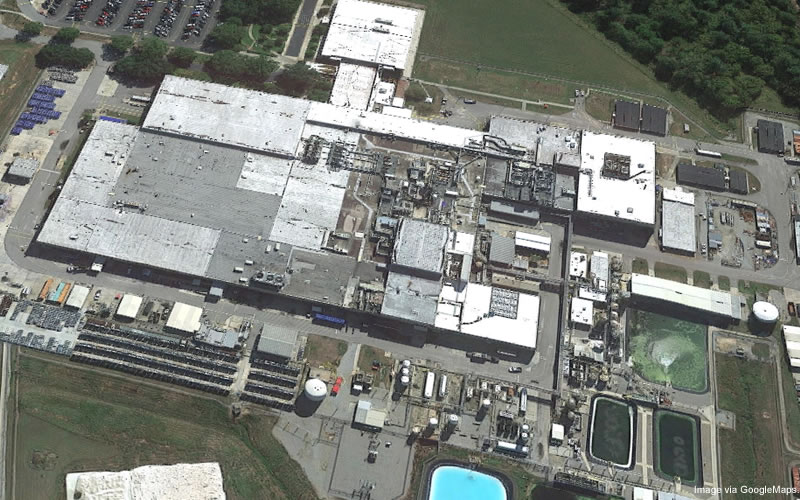
By Lindsay Street, Statehouse correspondent | A leak of nuclear material at a Columbia-area uranium fuel plant has prompted lawmakers and neighbors to ask why they weren’t notified as fears of groundwater contamination are renewed.
State and federal regulators say uranium that leaked through the plant floor poses no public threat, and the plant’s owner, Westinghouse Electric, has renewed a pledge to keep the community informed. State, federal and company officials say the plant is operating within guidelines.
But some state lawmakers are looking into the possibility of more state regulation and are questioning the plant’s leak history and shaky communications, which fuel concerns of nearby residents, such as Virginia Sanders of Hopkins.
“Westinghouse had promised they were going to keep the community abreast of what was going on but, right there, they had not kept us abreast that another accident had taken place. We had to get the information from The State newspaper,” Sanders told Statehouse Report.
Background
Westinghouse’s Columbia Fuel Fabrication Facility in Hopkins provides uranium-based fuel for nuclear plants. The plant opened in 1969 and it employs 1,100 people.
In 2011, the plant reported a uranium leak to the U.S. Nuclear Regulatory Commission (NRC). That leak did not become publicly known until 2014. After it became known, Westinghouse held a stakeholder meeting and promised changes in how it communicates with its neighbors, Sanders said.
History appears to have repeated itself with a leak this year, she added. Another leak was discovered in June but it wasn’t until a month later that residents found out about it in the newspaper.
“This is something that shouldn’t be happening in my community period. This is a wrong being committed by Westinghouse that needs to be stopped,” said Sanders, who lives seven miles from the plant and is an activist with the John Bachman Group of the Sierra Club.
The Sierra Club has sent a letter this month supporting a request by Friends of the Earth for the NRC to put a halt to a license renewal request by Westinghouse to keep operating the facility for 40 years.
 Westinghouse, the S.C. Department of Health and Environmental Control (DHEC) and the NRC say the leaks pose no public harm, and the uranium in the soil will not be cleaned up or contained until the plant is decommissioned, as reported earlier this week.
Westinghouse, the S.C. Department of Health and Environmental Control (DHEC) and the NRC say the leaks pose no public harm, and the uranium in the soil will not be cleaned up or contained until the plant is decommissioned, as reported earlier this week.
“Leaks occur any time you’ve got complex mechanisms with pipes, pumps, valves. Leaks happen,” NRC spokesman Joey Ledford told Statehouse Report. “The important thing is the leaks are repaired as soon as possible. He added it is “standard” for leaks to not be cleaned up until after a nuclear fuel plant is decommissioned. He said the plant has not violated any federal or state regulations.
A Westinghouse spokesman reiterated the plant is operating within regulations.
“Westinghouse is committed to acting promptly to report any incidents under our reporting requirements,” Westinghouse Vice President of Global Communications Courtney A. Boone said in a statement to Statehouse Report. “We take these events seriously and continue to work closely with our regulators and are committed to operating at the highest standard. Westinghouse welcomes the opportunity to have ongoing communications with our stakeholders on this and other issues.”
Fears of contamination
Uranium contamination can severely affect kidneys, according to the Centers for Disease Control and Prevention.
 DHEC has 38 monitoring wells around the Westinghouse’s sprawling 1,000-acre property.
DHEC has 38 monitoring wells around the Westinghouse’s sprawling 1,000-acre property.
“(They) are routinely sampled to detect and characterize groundwater contamination at the site. If there is a release into the environment and we determine that it could have potential effects on public health, we would notify citizens,” DHEC spokesman Tommy Crosby said in a statement to Statehouse Report.
NRC said Westinghouse is being monitored carefully for any spread of contaminants.
“There’s been no violations and no citations to date,” Ledford said. He said there is a regularly scheduled “full-scale” environmental inspection of the plant this fall. Those inspections are conducted annually.
Ledford said there has been no indication of any “migration” of nuclear materials either in the 38 monitoring wells around the site or into the deep-water aquifer below for the 2011 and the 2018 leaks.
“If that occured we would order immediate remediation,” Ledford said. He said the plant is required to keep a decommissioning fund to pay for future remediation.
Despite state and federal authorities saying groundwater has not been affected by uranium, Sanders said she’s not buying it, especially in the wake of the historic 2015 flood.
“How can you contain a leak in the soil in soil that’s as porous as soil is in lower Richland (County)?” Sanders said. “I cannot believe that material is just sitting there and not moving … That defies common sense.”
Senators may want more regulation
Some state lawmakers are floating nuclear regulation. S.C. Sen. Darrell Jackson, a Democrat who represents the district where the plant is located, said more needs to be done by the state to ensure safety of residents surrounding the plant.

“We definitely need more regulation,” Jackson said. “We’re still in the process of examining what happened, (but) at minimum there should be some type of method to inform constituents and policymakers so we can get things out. (Also) there needs to be some kind of buffer, maybe that houses that are in certain proximity to the plant will have their well tested on a regular basis.”
Sanders also said she wants the company to pay for a private company to perform water testing for nearby residences.
Republican lawmakers also questioned the plant’s leak history and shaky communication.

“You can’t not take care of your responsibility. We’ve got to look at it,” said S.C. Sen. Paul Campbell, a Charleston Republican who is the new chair the Senate’s Agriculture and Environment Committee.
Sen. Tom Davis, R-Beaufort, said he sees the recent leak and poor communication through the lens of South Carolina Electric & Gas and the $9 billion nuclear plants that were canceled.
“There seems to be a reticence among power companies to disclose information to the public. This would seem to be a continuation of that,” Davis said. “It demonstrates to me just how much work we have to do with our energy policy to restore the public trust again.”
But not all lawmakers were alarmed or even knew about the issue.
S.C. Rep. David Hiott, who chairs the House Agriculture, Natural Resources and Environmental Affairs Committee, said he was unaware of the leaks and any potential regulation would come from House Labor, Commerce and Industry Committee. That committee’s chair, S.C. Rep. Bill Sandifer, said he was unaware of leaks at the facility. He did not offer further comment.
- Have a comment? Send to: feedback@statehousereport.com


